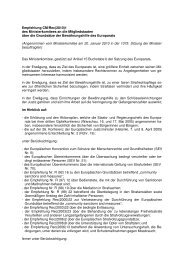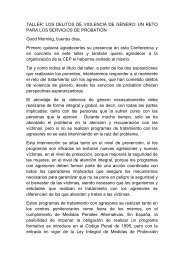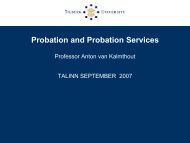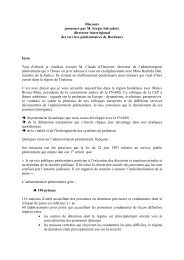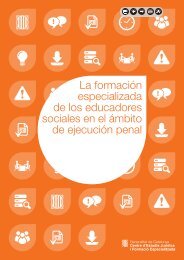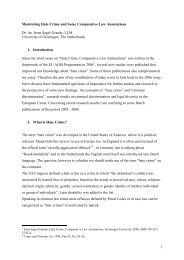ANNUAL REPORT - CEP, the European Organisation for Probation
ANNUAL REPORT - CEP, the European Organisation for Probation
ANNUAL REPORT - CEP, the European Organisation for Probation
Create successful ePaper yourself
Turn your PDF publications into a flip-book with our unique Google optimized e-Paper software.
Strategic objective:<br />
Enhance <strong>the</strong> professionalisation of <strong>the</strong> sector of probation in Europe<br />
Brian Stout<br />
tion of <strong>the</strong> Framework Decision on<br />
probation and <strong>the</strong> implementation<br />
of <strong>the</strong> Bachelor/Master structure at<br />
higher education level, <strong>the</strong> possibilities<br />
<strong>for</strong> working in <strong>the</strong> probation<br />
sector in ano<strong>the</strong>r <strong>European</strong> country<br />
are increasing. There<strong>for</strong>e <strong>the</strong>re<br />
was a need <strong>for</strong> <strong>CEP</strong> members, to<br />
join toge<strong>the</strong>r to discuss and learn<br />
more about training across Europe.<br />
According to Dr. Stout, who through<br />
his work is involved in <strong>the</strong> teaching<br />
of probation students and <strong>the</strong> shaping<br />
of <strong>the</strong> probation curriculum in <strong>the</strong><br />
UK, it is of great importance to create<br />
a common training framework.<br />
“The framework could contribute<br />
to <strong>the</strong> achievement of a consolidating,<br />
effective and humane probation<br />
service in Europe. It would also be<br />
of great benefit to those countries<br />
where probation work is in an early<br />
stage of development, providing a<br />
strong foundation <strong>for</strong> developing a<br />
common training programme, an<br />
opportunity <strong>for</strong> <strong>the</strong> sharing of learning<br />
and best practice.”<br />
The presentations during <strong>the</strong> conference<br />
made clear that probation is<br />
delivered in a wide variety of ways<br />
in EU member states. In some countries<br />
probation training is located in<br />
social work, in o<strong>the</strong>rs it is located<br />
in <strong>the</strong> prison service, and in o<strong>the</strong>rs<br />
it is stand-alone. There are national,<br />
political reasons <strong>for</strong> <strong>the</strong>se differences<br />
and it is difficult to imagine<br />
those changing. “In my view, greater<br />
unity is <strong>the</strong> correct aim, ra<strong>the</strong>r than<br />
standardisation,” says Dr. Stout.<br />
In <strong>the</strong> main <strong>the</strong> discussions<br />
focussed on debate as to how<br />
greater unity could be achieved<br />
and how complex standardisation<br />
might be. Dr. Stout thinks <strong>the</strong>re are<br />
three potential obstacles in obtaining<br />
a <strong>European</strong> Curriculum: “One<br />
obstacle is that national training<br />
providers will tend to develop curricula<br />
with a view to national considerations.<br />
Ano<strong>the</strong>r obstacle might<br />
be a temptation to focus on points<br />
of difficulty or difference, ra<strong>the</strong>r<br />
than to look positively at what<br />
could be achieved toge<strong>the</strong>r and <strong>the</strong><br />
benefits of a <strong>European</strong> Curriculum.<br />
A third obstacle is that change is<br />
always difficult; countries where a<br />
curriculum is already established<br />
may be disinclined to reflect on its<br />
content. None<strong>the</strong>less greater unity<br />
is achievable through setting some<br />
clear principles and benchmarks,<br />
and by promoting best practice.”<br />
Dr. Stout concludes that <strong>the</strong> general<br />
conclusion of <strong>the</strong> conference<br />
was that a <strong>European</strong> Curriculum is a<br />
significant goal and one that would<br />
be possible to achieve. In addition<br />
everyone left <strong>the</strong> conference with a<br />
greater sense of what is happening<br />
in o<strong>the</strong>r <strong>European</strong> countries. Some<br />
participants met towards <strong>the</strong> end<br />
of <strong>the</strong> conference and agreed on<br />
<strong>the</strong> need to start a project group<br />
with several clearly defined tasks.<br />
“It is important to build upon <strong>the</strong><br />
successes of <strong>the</strong> conference and<br />
streng<strong>the</strong>n an enduring network. In<br />
continuation, <strong>CEP</strong> could be driving<br />
<strong>the</strong> agenda of curriculum development,<br />
and reminding all of us of <strong>the</strong><br />
importance of <strong>the</strong> <strong>European</strong> element<br />
of probation training.”<br />
<strong>CEP</strong> <strong>ANNUAL</strong> <strong>REPORT</strong> 2009 10


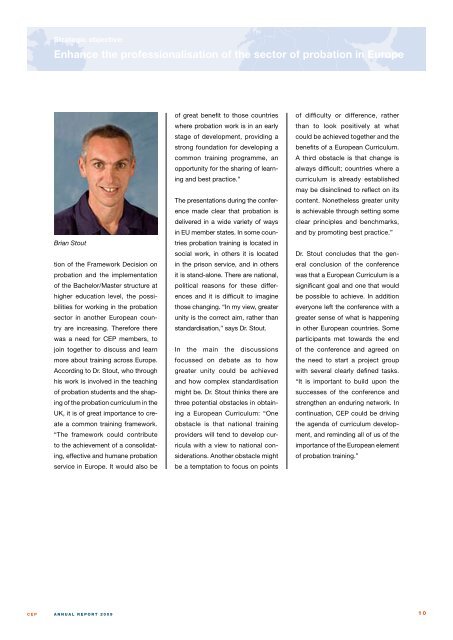
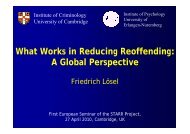
![AGIS2 Nov 08 Conference Report_[Version 2] - CEP, the European ...](https://img.yumpu.com/50764570/1/190x245/agis2-nov-08-conference-report-version-2-cep-the-european-.jpg?quality=85)
